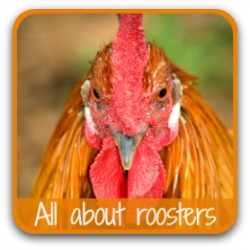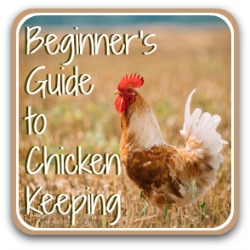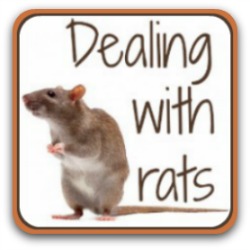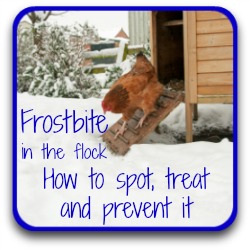5 good reasons why you shouldn't have a rooster - and more good reasons why you should.
Please note: the word for a male chicken in some places, including the UK, is "cockerel". In other places, "cockerel" refers only to males less than a year old. For ease of reference here, I'll refer to them all - whatever age - as "roosters" or "roos", which is the common American name.
So you're thinking of adding a roo (or maybe two!) into your flock and you're trying to work out whether that would be a good thing?
Or maybe you want to hatch your own chicks and you know one of the risks is that you'll get more males than females? Yep, it's happened to me!
So before you take the plunge, have a look at these reasons why having a male can bring more problems to your flock than you ever thought possible.
And then, check out the reasons why I wouldn't be without one.
The choice is yours!
Links on the rest of this page are "affiliate links". If you click on them and buy, I earn a small commission at no cost to you. I only recommend products I know and love and which I think will be genuinely useful to you. See my disclosure policy for more information.
Here's what's covered in this article.
If you want to skip to a particular section, just click its link.
1. It may be against the law.
If you're lucky enough to live in an area where hens are allowed, don't automatically assume that roos will be welcome too.
Very often, particularly in built-up areas like cities and towns, they're not just unwelcome - they're against the law.
Why? A variety of reasons, some of them based more on fear than reason. But the main problem is noise.
It would be unwise to introduce roos to your flock if they're illegal. Some people keep them anyway and either home them in a basement, or use "no-crow collars" to try to minimise the 5am crowing.
But it only takes one neighbour who isn't rooster-friendly to complain, and you have a whole new problem on your hands.
Is the place where you live rooster-friendly? Read more about chickens and the law for detailed information, and some ideas about what to do if it's not.
2. They're noisy.
We've already touched on this - the crowing. Roosters crow to welcome the dawn. They crow to welcome the dusk. They crow when there's a potential danger for the flock, and they crow just because they're a rooster.
And not everybody likes the noise. The hens don't seem too impressed, for example.
I have to admit, I do. Hearing the sound of a young male making his first attempts at crowing can always bring a smile to my face. But it's not everybody's cup of tea.
Is there anything you can do to stop it? The most common method is to use the "no-crow collar", which is basically a velcro strap wrapped around the neck, which reduces the flow of air to the airways so the roo just can't get enough wind up to make the noise.
The crow then becomes muffled.
Do they work? Many people swear by them, many others say they're a total waste of time and money.
And they do not stop the crowing altogether.
If you decide to try one, it's extremely important to monitor your roo when he first wears it.
There have been cases of the collar being applied too tightly, and roos dying as a result.
3. Roosters fight with each other - and with you.
You've probably heard of "cock-fighting" - it's a common occurrence in Asia and some parts of South America, though illegal in many other places including the US and UK.
But it's not only males bred for fighting who are aggressive. Once those male hormones kick in at about 12 months old, backyard roosters can also become a menace.
Why does it happen? Because they instinctively protect their flock. Anything or anyone who is seen as a threat, or anyone who presents - as the roo sees it - a threat to their dominance, needs to be taught a lesson.
 The result of an attack by one of my roos.
The result of an attack by one of my roos.This was the result of one of my roos, Mr Woo, teaching me a lesson when I was collecting eggs one day...
He flew at me, spurs first, and ripped into me. He left scars on both legs. They weren't long cuts, but they were deep enough to require steri-strips...
Is that something you'd be prepared to live with?
And if it's something you could handle, how about children who visit your chicken run? Do you feel they'd be safe?
Of course, not every rooster is aggressive. But it is part of their DNA - it's what they're meant to do.
And there are ways of controlling it, without doing any damage to the rooster. I deal with that in detail, in my article about managing aggressive roosters.
So all I'm saying is - think about it before you buy, or before you hatch.
4. Roosters will give your hens a hard time.
 Roosters are lacking in finesse!
Roosters are lacking in finesse!So if the roo's not giving you and your family a hard time, how about the hard time he'll give your girls?
Because the "courtship" of a male and female chicken is not, by anyone's standards, a romantic gesture. It's all over in a matter of seconds.
No flowers. No meals out.
What does the hen get, then?
She gets - literally - trodden on.
When the roo mounts her, he holds on by gripping her side with his spurs and her neck with his beak. Then he literally "treads" the side of the hen.
It may only take a few seconds, but it can have a devastating effect on the hen - especially if he has a "favourite", which many roos do.
Here's what happened to one of my Black Copper Marans hens when Mr Woo decided she was to be graced by his "presence".
Yep, that's all done by an over-zealous rooster.

Could you put your girls through that?
Sure, there are ways of dealing with it. Segregating the males, for example, if you have the room. Or buying a hen saddle (also known as a hen apron), which is how I dealt with this.
The saddle protects the hen's back and sides until feathers can grow back, to make them less painful.
Is that what you want for your ladies?
5. Roosters fertilise eggs.
It's one of the main reasons backyard chicken keepers have males - to produce more chickens. Because, of course, if there's a rooster with hens, there are going to be fertilised eggs.
You can tell they're fertilised by the tell-tale "bullseye" on the yolk...
 How do you like my little chicken dish, by the way? Found at a local Italian flea-market!
How do you like my little chicken dish, by the way? Found at a local Italian flea-market!Which is great for hatching more chickens...
But how do you feel about eating eggs that have been fertilised?
There's no difference whatever in the nutritional value. It used to be thought there was, but that's an urban myth and has been disproved by science.
Not everyone feels comfortable eating an egg that could have become a chick. Of course, it's not a problem if you don't have a male chicken around.
No male, no fertilisation. Just an egg.
So if you want to hatch from your own flock, fine. If not - why would you keep a roo?
And the good reasons why you should have a roo?
So, don't have a roo if...
- It's illegal in your area
- You hate the idea of early morning (or anytime) crowing
- You don't want to be given a hard time
- You don't want your hens to be given a hard time
- You wouldn't be comfortable eating fertilised eggs.
But...
I have (no more than) two roos in my flock at any one time (I use the ratio of at least ten hens to one male). Why do I have roos?
There are some good reasons. And there are solutions for some of the problems roosters can bring.
Take a look at the bonuses of having a rooster before you make your final decision.
















